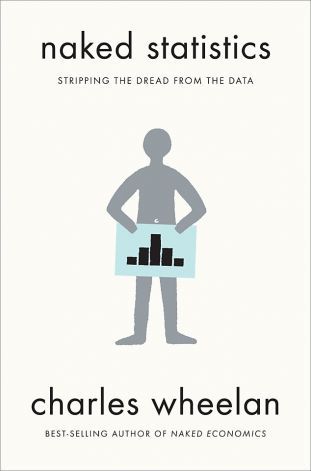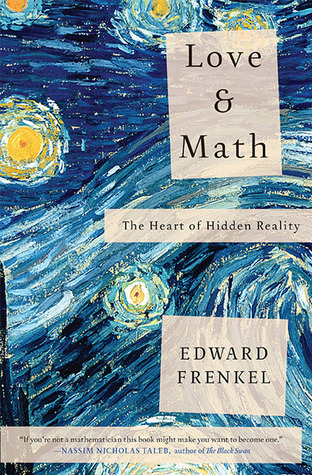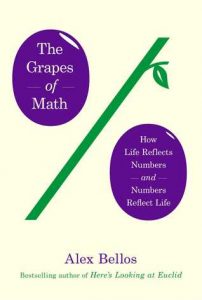 Yeah, I know. Statistics. Really. I must have run out of things to write about, right? Yes*, but also, no. Stats can be fun! Especially when you’re not being tested on it, and you’re reading just for yourself. And perhaps more importantly, a basic understanding of stats is important, in the sense that it’s important to know at least the basics so you’ll realize when you’re being presented with something that is based upon either no data, or the data has been misrepresented (and if so, then you can dig around a bit to find out why), or even sometimes the data might not add up. So I’m here with an introductory text you might be interested in to get you started: Naked Statistics by Charles Wheelan.
Yeah, I know. Statistics. Really. I must have run out of things to write about, right? Yes*, but also, no. Stats can be fun! Especially when you’re not being tested on it, and you’re reading just for yourself. And perhaps more importantly, a basic understanding of stats is important, in the sense that it’s important to know at least the basics so you’ll realize when you’re being presented with something that is based upon either no data, or the data has been misrepresented (and if so, then you can dig around a bit to find out why), or even sometimes the data might not add up. So I’m here with an introductory text you might be interested in to get you started: Naked Statistics by Charles Wheelan.
If you’ve taken an introductory statistics course – even if the last time you took one was in high school – you’ll likely find a lot of the information presented in here a refresher. If you’re starting from scratch, Wheelan does a pretty good job breaking down concepts such as standardization, inference, correlation, and regression analysis, describing where you’ll encounter them as well as telling you how data can be misrepresented. You’ll learn about different types of experiments, and the ones from which you can conclude there to be a cause-and-effect relationship, versus the ones from which correlation does not imply causation. It’s accessible, it can be funny, and you’ll come away at the end of the book armed with a basic understanding of probability as well as examples to draw on next time you’re asked to explain the central limit theorem. You’ll be the life of the party – I guarantee it.
*Kind of… a little bit.
For a few more introductory books to statistics (you might not need to read all of them, as these below are all introductory texts, so they will cover mostly if not completely the same ground), see these:
- The Signal and the Noise by Nate Silver – recommended by Kasey!
- Introducing Statistics (A Graphic Guide) by Eileen Magnello
- Scrumptious Statistics by Lisa Arias, which is directed towards children but I’m sure works for all ages as a brief intro.
- And of course, Statistics and Understand Statistics by Alan Graham. These are both part of the Teach Yourself series.
If, on the other hand, you think you need a bit of a push to get you to even want to get into learning about stats, I’m going to point you towards a couple of books about mathematical concepts written by people who live, breathe, and love math and want you to share their passion. In my opinion, they do a pretty good job.
The Grapes of Math and Here’s Looking at Euclid by Alex Bellos, while I haven’t read the Euclid one, are both great introductions to mathematical concepts and games! I found the chapter on the Game of Life absolutely fascinating in The Grapes of Math, personally, and it’s definitely not what someone might immediately think of when someone says “math”! There are anecdotes galore and comics that accompany every chapter that will make you smirk at least. You’ll learn about infinity and why the concept itself isn’t as simple as you might think at first, along with how negatives, too, took a while to be safely couched in math. And if you never paid much attention in math class, you can learn about the good ol’ sohcahtoa all over again – the classic. Bellos also covers pi, trigonometry, calculus – the usual subjects – before jumping ahead to the Game of Life. I won’t spoil it for you though, because I think Bellos does a wonderful job recounting the rules and all that’s come of it.
I haven’t read this one personally, but I think The Joy of X by Steven Strogatz probably covers similar material to Bellos’ two books. I would probably borrow all of them to make sure I’ve covered all the ground these two authors write about though. Even if there’s some overlap, hearing it from a different voice might help you understand the concepts better, too.
 Love & Math by Edward Frenkel was my first foray into reading about math, because I definitely did not – do not – regularly associate the word “love” with “math”, and while I enjoyed what I read of it, I will confess I did not complete it. I had some other items coming up due and there was no way I could finish this in time. But this is something I would pick back up again in the future!
Love & Math by Edward Frenkel was my first foray into reading about math, because I definitely did not – do not – regularly associate the word “love” with “math”, and while I enjoyed what I read of it, I will confess I did not complete it. I had some other items coming up due and there was no way I could finish this in time. But this is something I would pick back up again in the future!
It’s dense, and although the target audience is (presumably) the average person with an average reckoning of mathematical concepts, I get the feeling Frenkel might have overestimated the mathematical knowledge & understanding of his audience (as a Goodreads user notes as well). Which is not to say it’s impenetrable! You’ll have to set aside some time to really get into the groove of reading this, but I’m sure you won’t regret it. Love & Math is held together throughout by Frenkel’s own life as he recounts his experience of being rejected by a school because he is Jewish, of finding a teacher willing to take him under his wing anyway, and about his own research. It’s all quite interesting, so there should be something to hook you in even if you’re not a math aficionado. But after wading through all the books I’ve listed in this post, I’d be more surprised if you’re not even the slightest bit interested in becoming one!

I tried to read Love and Math at some opint last year and gave up on it the end, as well. Frankel is one of those math people who is in so deep he’s way out of touch with the average person’s handle on math. I so wanted to love the book, because the premise is truly wonderful and relatable to me (I’m very much of the belief that anyone can be made to undersand and appreciate the beauty of numbers), I just really don’t think he accomplished his goal at all.
I’d recommend Things to Make and Do in the Fourth Dimension for a better layperson’s adventures through math. And if you want more along the lines of Naked Statistics, you’d probably also like The Signal and the Noise,
Thanks for the recommendations, Kasey! I’ve added The Signal and the Noise to the list of suggested reads.
I’ve got Things to Make and Do in the Fourth Dimension checked out right now – I’m pretty excited to make my way through it once I get a couple other books out of the way first. I’m so glad others are also reading through the math section for leisure!